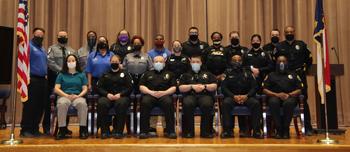
Officers Labretta McBryde and Shayanna Johnson of UNC Pembroke’s Police and Public Safety recently completed Crisis Intervention Training (CIT) at the Samarcand Training Facility in Moore County. The facility is operated through the N.C. Department of Public Safety. It provides basic, in-service and advanced training for law enforcement agencies and correctional officers, probation/parole officers and juvenile justice employees.
“Law enforcement officers are often the first point of contact for someone who is experiencing a mental health crisis,” explained UNCP Police Chief McDuffie Cummings. “Because of this, our university is introducing Crisis Intervention Team training in our law enforcement department to ensure our team is prepared to help students or other campus community members if they are experiencing a crisis,” he continued.
Crisis Intervention Team training is a specialized police curriculum that aims to reduce the risk of serious injury or death during an emergency interaction between persons with mental illness and police officers. CIT has been implemented widely both nationally and internationally and it emphasizes understanding of mental illness and incorporates the development of communication skills, practical experience and role-playing.
Officers McBryde and Johnson are the latest of 10 officers within the university’s department to complete the training.
According to the Bureau of Justice Assistance, CIT training has better prepared officers to work with individuals with mental illness, resulting in fewer arrests of people with mental illness, increased understanding of mental illness and awareness of what to look for in people who might be in crisis.
CriminalJusticePrograms.com explains how individuals having a mental health diagnosis can suffer from stress, resulting in panic attacks, the inability to decipher reality and a tendency to lose composure under stressful conditions and situations. Some of these situations can drive an individual to display out-of-control behavior which may be erratic or threatening behavior towards themselves or others. These situations can be tense, but having the proper training for officers responding to these calls can help them to recognize when individuals are suffering from a mental health crisis. Proper training is also essential for determining how to handle these situations appropriately and can ultimately save lives.
Chief Cummings shared how imperative ongoing training is for the department, whether it is crisis response training, technology-led, community-oriented or communicative. “We are committed to serving our students in the safest way possible. Having our officers trained to navigate potential crises situations through this course makes us even more prepared to protect and serve.”